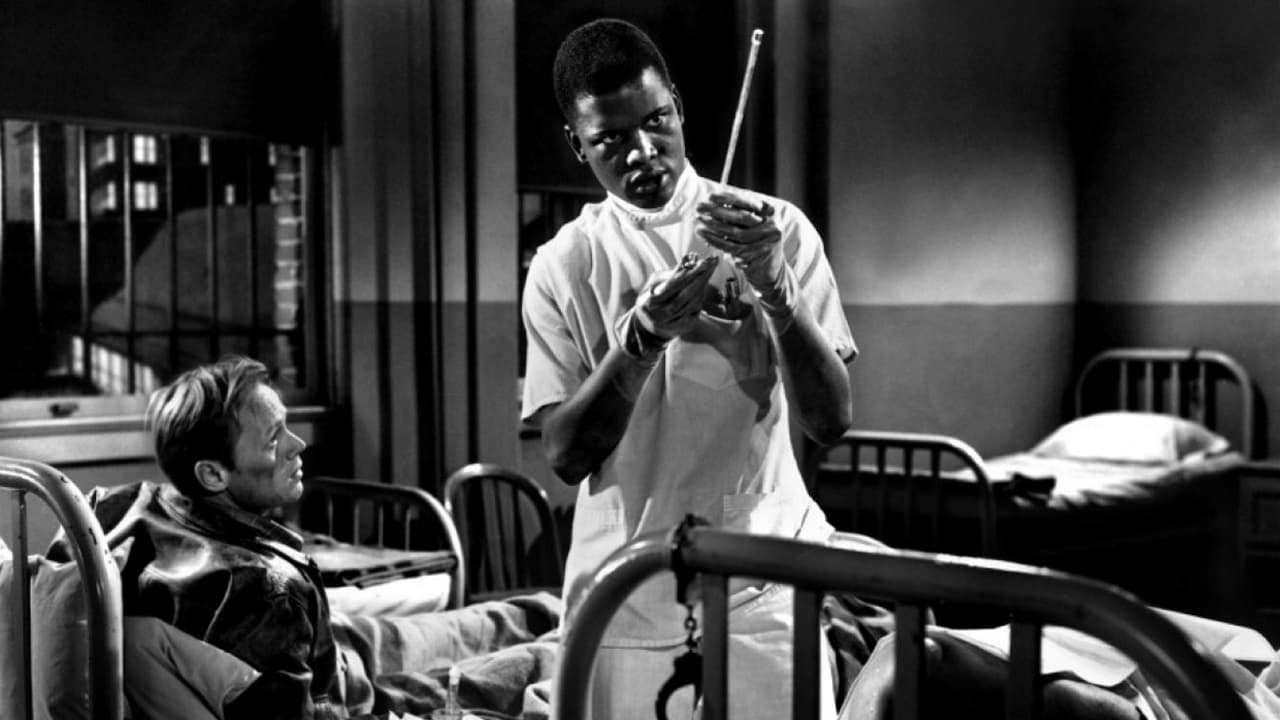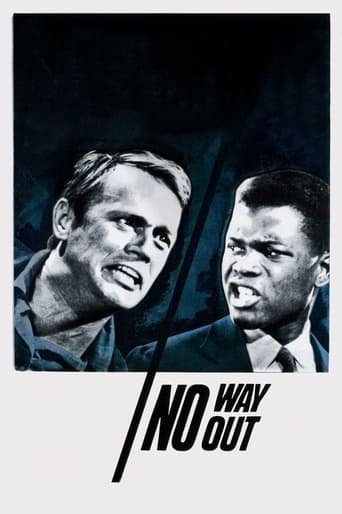

When Richard Widmark and his brother are shot in a robbery gone wrong, they are rushed to the hospital. Both are pretty racist and not afraid to show it, so when young doctor Sidney Poitier attends to their injuries, they verbally abuse him. Sidney thinks the stream of hatred is due to a brain tumor, but in his diagnosis and treatment, one brother dies. Richard Widmark believes Sidney murdered his brother on purpose, because racism in the hospital runs rampant on both sides, and he tries to get even. There's "no way out" of the hospital, but also no way to escape the hatred in the air.Not only is this one of the great shocking films of the 1950s that deals with racism, but it marks Sidney Poitier's film debut! It was quite a break for him, although he had to lie about his age to get the part, and he gives the first of many performances that break the color boundary in acting. You'd be hard pressed to see a movie that cast a black actor as a doctor in the 1940s. Both leads put their whole hearts into their performances; you'd never believe they were friends offscreen. Dick actually felt so terrible about saying racial slurs to Sidney that in-between takes, he would often apologize—it just goes to show you sometimes actors who get typecast as the bad guy are actually nice in real life!
... View MoreA cartoonish movie by left winger Mankiewicz.He lays it on so thick the movie becomes a joke at many points.This lame attempt at a movie comes across like a fifth rate stage play.The dialogue is tedious, overlong at several points, especially where one character talks too long without any relief in the form of response from the character he is talking to.An example is the scene where the head of the hospital goes on and on and on in an early scene in his office with the white head doctor.Widmark gives a cartoonish, cornball performance.Linda Darnell makes the most of the material she is given.
... View MoreThis is truly a remarkable, outstanding film dealing with racism at its worst.Richard Widmark, as the racist hoodlum, delivers a walloping performance.By the way, Sidney Poitier, as the black physician who is unfortunate enough to have Widmark's brother die while being examined, is the real star of the movie. While this was his first film, how come in the cast he was placed in the opening credits in the supporting division? They should have at least said and introducing Sidney Poitier as Dr. Brooks.Widmark, the epitome of racism here, is so bigoted that he will not even accept an autopsy result showing that his brother had a brain tumor. AS a result of this, we have a race riot on our hands.Linda Darnell is Widmark's former sister-in-law who comes to realize that such hatred gets one nowhere. I've never seen Darnell so good in a film role.The ending does show us some racial toleration, but it all shows the terrible outcome of racial prejudice. Factors including ignorance bringing about such hatred are vividly shown here.An absolutely fabulous film. Unfortunately, we don't hear much about this movie. We even see levels of institutionalized racism at the hospital where the head doctor, Stephen McNally, is warned that they (the hospital) shouldn't lose funding because a black doctor was involved in the person's demise.
... View MoreNo Way Out (1950) *** 1/2 (out of 4) A vile, racist criminal (Richard Widmark) is brought into a hospital where he objects to being treated by a black doctor (Sidney Poitier). The doctor eventually begins to work on the man's brother who eventually dies and this leaves the racist thinking that the doctor killed him on purpose, which sets off a wide range of events, which leads to a race riot as well as the black doctor having to make a decision that could effect his future. It's rather amazing watching this film because you really have to keep pinching yourself and reminding yourself that this movie was made in 1950. This thing remains pretty shocking by today's standards so I can't even begin to imagine what it must have been like seeing this sixty-years ago. I think it's fair to say that a movie like this could never be made today and I think it's safe to say that it would have never been made had it not been for Zanuck. What's so shocking about this movie is how ugly and vile the racism is. A lot of films that deal with race throw out the "n" word but here the words are just so utterly deprived, disturbing and at times brutally ugly that you can't help but feel as if you really are watching hatred at work. Future race films, even the great ones, didn't really show how ugly words could be and that's why this film is so ahead of its time and I'd say the "right" time for this hasn't even happened yet. There are many amazing moments throughout this film but I think the main reason for its greatness is due to the performances by the two leads. Widmark made a career out of playing scumbags but the pure evil he brings to this role without question makes it one of the greatest villain performances out there. I had no problem believing that I was seeing a man eaten up with hatred and how Widmark pulled this off is beyond me. Some could say that words are words but Widmark just does something to make them so meaningful and so painfully ugly. The vile character is one you want to hate and this too goes against the Poitier character. I'm not sure how Poitier got fourth billing and after the main title as he's pretty much the star of the film. In his first role it's amazing to see how much power and dignity he could put on camera. Even from the very first time we see him we can see the power that his character has as well as the dignity and his belief that he must always do the right thing. I think the film's greatest moments are early on when Poitier is trying to treat the man while not letting Widmark's insults effect him. Seeing Widmark and Poitier working together created some true fireworks and some unforgettable moments. Ossie Davis and Ruby Dee are strong in their supporting roles as are Stephen McNally and Mildred Joanne Smith. Linda Darnell plays part of the "trash" who must overcome some of her own feelings on race. She too delivers a strong, first class performance. I think the film loses a small bit of power as the story gets a little bigger and doesn't focus just on the doctor and the patient but this is just a minor issue. I think some of the later race movies on a whole were better but there's no denying the power and originality this one has. The incredibly vile character is certainly one of the most memorable out there and the work by Widmark and Poitier makes this a must see.
... View More